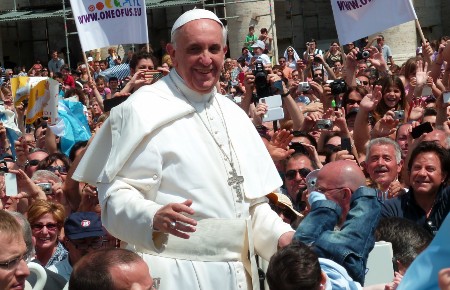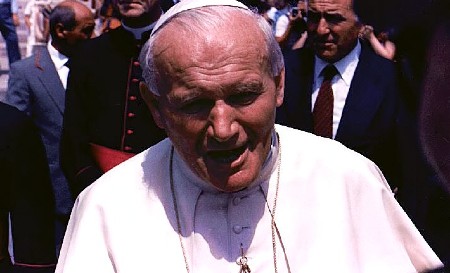We ask you, humbly: don't scroll away.
Hi readers, it seems you use Catholic Online a lot; that's great! It's a little awkward to ask, but we need your help. If you have already donated, we sincerely thank you. We're not salespeople, but we depend on donations averaging $14.76 and fewer than 1% of readers give. If you donate just $5.00, the price of your coffee, Catholic Online School could keep thriving. Thank you.Help Now >
Three Signs of a New Testament Church and My Journey Home to Rome
FREE Catholic Classes
"To be deep in history is to cease to be a Protestant," famously wrote John Henry Cardinal Newman in his introduction to his Essay on the Development of Christian Doctrine. I can attest to the truth of these words. I started reading the nineteen centuries' old works of St. Ignatius, the third bishop of Antioch when I was a Protestant. By the time I finished, I was well on the road toward becoming a Catholic.
We ask you, humbly: don't scroll away.
Hi readers, it seems you use Catholic Online a lot; that's great! It's a little awkward to ask, but we need your help. If you have already donated, we sincerely thank you. We're not salespeople, but we depend on donations averaging $14.76 and fewer than 1% of readers give. If you donate just $5.00, the price of your coffee, Catholic Online School could keep thriving. Thank you.Help Now >
Highlights
Catholic Online (https://www.catholic.org)
7/31/2012 (1 decade ago)
Published in Living Faith
Keywords: Ignatius of Antioch, Eucharist, the church, bishops, liturgy, bible, scripture, magisterium, Andrew Greenwell
CORPUS CHRISTI, TX (Catholic Online) - Most evangelical or fundamentalist Protestants believe in the perspicuity of Scripture. They have to because they have rejected any teaching authority in the Church. Simply put, the doctrine of perspicuity of Scripture is that, in the words of Charles Hodge, the Protestant theologian and founder of Princeton Theological Seminary, the "Bible is a plain book," and therefore requires no one to interpret it.
The theory of perspicuity advances the notion that a man can sit down at home with a Bible in hand, and, presumably with the guidance of the Holy Spirit, will have no problem understanding the Bible's doctrine. There is no need for an intermediary, no need for a teaching Church, no need for an ecclesia docens. There is therefore no need for bishops and certainly no need for a Pope.
Some problems are immediately apparent in holding the doctrine of the perspicuity of Scripture. First of all, there is no place in the Scriptures that states that the Bible is perspicuous. Indeed, there is no place in the Bible that tells us what books compose the Bible, which means that what books are in the Bible is itself not perspicuous. There is simply no Biblical foundation for the doctrine. It finds no warrant in Scripture or the words of Jesus.
In fact, the falsity of the doctrine of the perspicuity of Scripture appears clearly attested to by Scripture itself, expressly at least as it relates to the epistles of the Apostle Paul and implicitly with respect to Scripture as a whole. St. Peter says: "in them [St. Paul's letters] there are some things hard to understand that the ignorant and unstable distort to their own destruction, just as they do the other scriptures." (2 Pet. 3:16).
It is perspicuous to St. Peter that the Bible is not perspicuous.
The doctrine of Scriptural perspicuity was never part of the received Church teaching, just like it clearly was not part of what St. Peter believed to be true. It was a Protestant novelty. It is a contrived truth to escape the Church's divinely-instituted teachers--the bishops and the Pope--and to escape the body of Tradition which testifies against its truth.
In addition to its theoretical lack of foundation, there is another problem with this notion: it does not work. The doctrine of the perspicuity of Scripture has been a practical nightmare. Although a precise count of Protestant denominations is probably impossible, most experts put Protestant denominations at hovering between 21,000 to 33,000 world-wide, each one, of course, with its own view of supposedly perspicuous Scripture that justifies its existence. The number of interpretations of Scripture is legion.
What time has therefore attested to is that Protestant model is intrinsically unstable and uncertain, and that suggests overwhelmingly strongly that it is false. The historical evidence is monolithically against the truth of the doctrine of perspicuity of Scripture. As Origen said in his work On Prayer, "the word of God is one, but many are the words alien to God."
I confronted this problem of interpretational cacophony endemic in Protestantism on my way back to the Catholic Church. Although raised Catholic, by the time I went to college I had left the Church and pretty much rejected Christianity altogether, sort of holding an incongruous blend composed of intellectual agnosticism and practical atheism. Towards the end of my undergraduate studies, however, I had a conversion, but that conversion was to evangelical or fundamentalist Protestantism.
Eventually, I found myself frequenting Southern Baptist Churches. I accepted the authority of Scripture sort of on faith, and assumed that it was readily interpretable as the Southern Baptists taught.
However, I soon grew frustrated with the impracticability and unworkability of the doctrine of Scriptural perspicuity. Take, for example, the words of Jesus in the sixth chapter of the Gospel of John, "Amen, amen, I say to you, unless you eat the flesh of the Son of Man and drink his blood, you do not have life within you." (John 6:53) How were these words to be understood? Many of Jesus' disciples obviously had problems with them. The Gospel of John states that many murmured: "This saying is hard; who can accept it?"
For some, the teaching was offensive, and when Jesus confirmed it, they left him altogether, presumably because they understood Jesus to be teaching these words to be literally true--something which, of course, would have offended the sentiments of the ordinary Jew.
Most Protestants will interpret these words figuratively, symbolically, and avoid the difficulty of what seems Jesus' plain teaching. When I read them, however, they seemed clearly to state that they were not to be intended figuratively or symbolically, but really and literally.
So who was right? Given the diverse views on this among well-meaning persons, it seemed pretty clear that the Scriptures were not as perspicuous as Protestants claimed. And this seemed to be an important teaching, one upon which Jesus said eternal life depended.
Where was I to go for an answer? I sort of felt like the Ethiopian reading Scripture who was approached by the Apostle St. Philip as recorded in Acts 8:30-31:
"Do you understand what you are reading?
"How can I, unless someone guides me?"
But I had no Apostle Philip to guide me.
I decided therefore that I ought to go to those who were closest to the Evangelists who wrote the words of the Gospels. "Surely there must be some historical record of these sorts of people?" I thought.
There is. They are called the Apostolic Fathers. The Apostolic Fathers are Christian authors who wrote in the second half of the first century and the first half of the second century. Three of the most important are St. Clement of Rome, St. Ignatius of Antioch, and St. Polycarp of Smyrna. They were taught by the Apostles, and some even wrote while some of the Apostles were still living.
So I turned to the Apostolic Fathers sort of like the Ethiopian turned to St. Philip.
I will never forget the experience as a Southern Baptist in picking up the epistles of St. Ignatius of Antioch. On his way to Rome to be martyred for the faith, St. Ignatius--the second bishop of Antioch (unless we count the Apostle Peter among them, in which case he would be the third)--wrote to a number of local churches: at Ephesus, Magnesia, Tralles, Rome, Philadelphia, and Smyrna. These epistles have been preserved. Originally written in Greek, English translations are readily available.
By the time I finished these epistles, I was no longer Southern Baptist. I realized that whatever Church I had to belong to had to have three signs: (1) ordained bishops, (2) a liturgy, and (3) the sacrifice of the Eucharist as the center of worship. None of these were to be found in any real sense in the Southern Baptist denomination.
Imagine my surprise when I encountered words such as these in St. Ignatius of Antioch in his epistle to the Smyrnaeans:
"See that you all follow the bishop, even as Jesus Christ does the Father, and the presbytery [priests] as you would the apostles; and reverence the deacons, as being the institution of God. Let no man do anything connected with the Church without the bishop. Let that be deemed a proper Eucharist, which is [administered] either by the bishop, or by one to whom he has entrusted it. Wherever the bishop shall appear, there let the multitude [of the people] also be; even as, wherever Jesus Christ is, there is the Catholic Church."
Or these words, in his epistle to the Philadelphians:
"Take heed, then, to have but one Eucharist. For there is one flesh of our Lord Jesus Christ, and one cup [to show forth] the unity of His blood; one altar; as there is one bishop, along with the presbytery [priesthood] and deacons, my fellow servants: that so, whatsoever you do, you may do it according to God."
As to the Eucharist, is there any doubt about how St. Ignatius felt? How could anyone take the apostolic doctrine to be that Jesus' words on the Eucharist should be taken symbolically or figuratively when he confronts such words as these?
"Let no man deceive himself. Both the things which are in heaven, and the glorious angels, and rulers, both visible and invisible, if they believe not in the blood of Christ, shall, in consequence, incur condemnation. He that is able to receive it, let him receive it. . . . But consider those who are of a different opinion with respect to the grace of Christ which has come unto us, how opposed they are to the will of God."
Nowhere is there any record of dissent to these teachings of St. Ignatius of Antioch accusing him of a novelty in maintaining the importance of ordained bishops and priests to whom the people owed obedience. There is nothing to suggest he was doing something extraordinary in instructing Christians to gather for Sunday Eucharistic services that were sacrificial in nature, revolved around an altar, and involved the offering up and consumption of the Body and Blood of Christ.
"To be deep in history is to cease to be a Protestant," famously wrote John Henry Cardinal Newman in his introduction to his Essay on the Development of Christian Doctrine. I can attest to the truth of these words. I started reading nineteen centuries' old works of the third bishop of Antioch a Protestant, and by the time I finished, I came out a Catholic.
-----
Andrew M. Greenwell is an attorney licensed to practice law in Texas, practicing in Corpus Christi, Texas. He is married with three children. He maintains a blog entirely devoted to the natural law called Lex Christianorum. You can contact Andrew at agreenwell@harris-greenwell.com.
---
'Help Give every Student and Teacher FREE resources for a world-class Moral Catholic Education'
Copyright 2021 - Distributed by Catholic Online











 Daily Readings for Friday, April 26, 2024
Daily Readings for Friday, April 26, 2024 St. Cletus: Saint of the Day for Friday, April 26, 2024
St. Cletus: Saint of the Day for Friday, April 26, 2024 Prayer before the Closing of the Day: Prayer of the Day for Friday, April 26, 2024
Prayer before the Closing of the Day: Prayer of the Day for Friday, April 26, 2024

